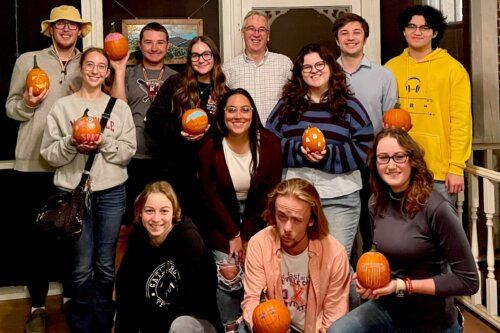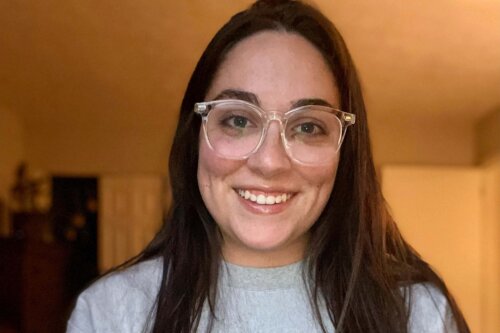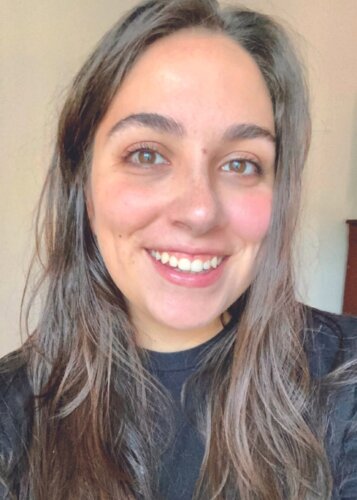Alina Rosati ’24: A journey of self-discovery, reinvention leads to a Senior Study at Maryville College
Dec. 18, 2023
It’s been almost a half-century since philosopher and historian Hannah Arendt died, but at MC, recent graduate Alina Rosati found the space and encouragement to explore herself and build her Maryville College Senior Study through Arendt’s works.
Through her Senior Study — a centerpiece of the MC experience in which every degree candidate works with a faculty supervisor to expound upon scholarship and ideas in their respective degree fields — Rosati was able to find closure with a troubled past, insight into her personal development, and set out a clear vision for her future. And while she may have accomplished the same at another institution, she says, it was at Maryville College where she was pushed by faculty mentors to embrace and pursue holistic thought.
“The professors have never tried to force their own philosophy on me,” Rosati says. “In fact, were it not for them encouraging me to find what I wanted, I would never have found Hannah Arendt. That, combined with the small classrooms at Maryville College, the personalized advising, the pretty campus … I didn’t even realize how much that would mean to me. Even if I’m in a bad mood, coming in from Knoxville and driving to class and seeing the mountains just makes it all better.”
An exploration of Arendt
These days, bad moods and bad days are much more infrequent than they used to be, thanks to work that began before she arrived at MC as a transfer student and continued through her intellectual exploration of philosophy. Pursuing it as a major was a radical change from her days in pre-med at the University of Tennessee, but it’s a far better fit for a mind that hungers for new experiences and new insight into the ways human beings interact with themselves and the world around them.
“The education of pre-med bored me, and I was sure that whatever’s wrong with the world could be found in philosophy,” says Rosati, who started her educational reset at Pellissippi State Community College before transferring to MC. “At first, what I found was a lot of bad philosophy, and I had to do work to find Hannah. Coming here, I realized it’s a huge financial risk to get a degree in Philosophy. Am I old enough to recognize that? Yes. Do I still want to do it? Yes.”
“Alina had shared with me some of her journey from being a smartphone-scrolling teen to an aspiring philosophy student in our one-on-one advising meetings,” said Dr. Andrew Irvine, associate professor of philosophy and religion at Maryville College. “But it was being introduced to Hannah Arendt’s notion of the ‘banality of evil’ in my class on Comparative Philosophy of Evil that set a fire in her mind.
“Arendt describes how some of the worst things that people do — her main case is the Holocaust — is not because they are deeply, radically bad, but because they are so superficial. Completely preoccupied about ‘fitting in’ with everyone else, they never ask themselves whether what everyone else is doing is a good thing. So ‘banal evil’ is the spark that illuminates Alina’s thesis, which is a sort of philosophical memoir: it is rooted in a description of her personal story, but it reaches out to address the impact of scrolling on our culture, our politics, and ourselves.”
Scrolling — the act of digital obsession that sees smartphone owners lost in a sea of pixels, constantly swiping left and right or thumbing up and down for the next bump of dopamine found in a sea of social media platforms — is something with which Rosati is painfully familiar. Although she grew up in Loudon, Tennessee, she was born in Germany to a father in the military. He moved to East Tennessee when she was 5; her mother settled in the Seattle area, and she spent summers there.
“With that kind of worldly energy and experience, it’s no wonder I was drawn to philosophy,” she says.
Her grades earned her a scholarship to UT, where she entered the pre-med program in biology. Academics, however, took a backseat to other things.
“In high school, I survived by doing homework 5 minutes before class, but when I got to college, I started drinking all the time,” she says. “After great reflection, I think I had a lot of guilt for going off to school and leaving my small town, because it felt like I was trying to run off to the city and be better than everybody else. So I ended up dropping out, and I didn’t even have a good reason.
“I was pretty manic at the time with a prescription for Adderall. I was waitressing, and I always had a boyfriend — and sometimes I had a few. I would impulsively quit jobs, and I was always online. Always on social media. I just was not a great person, and I was always looking for the next high.”
‘Tree time’ and the rediscovery of self

Call it a moment of clarity, a spiritual awakening or a number of other terms: Rosati experienced one on April 20, 2018, listening to the album “KOD” by the rapper J. Cole. A song cycle built around sensory seeking, escapism and breaking free of past trauma, it triggered something in Rosati, who made the decision that day to get her life together.
For the next year and a half, she embarked on what she calls “tree time,” derived from another musician: Hip-hop artist Raleigh Ritchie and his song, “Time in a Tree.”
“For some reason, that was the only song that brought me comfort in that time,” she says. “I was feeling pretty bad, and the point of the song is that he’s made so many mistakes. He needs to let out his sadness, to grieve, to stop denying it and putting it off. It’s about accepting that you’re sad.”
She ended a relationship she describes as abusive, constructed a vision board to help document and process her journey and bought a “lot of plants,” she adds.
“I would sit in a chair and look at those plants, and I forced myself to go back and remember my relationship, and then I would listen to music that matched my feelings,” she says. “By forcing myself to sit in a chair and talk to plants and cry, I was able to figure out why I was emotionally stunted.”
Although her later work in philosophy helped her understand that she was living truths espoused by Arendt and philosopher Martha Nussbaum in using her experiences to put labels on her emotions in order to better understand them, in the moment she simply called it “tree time,” a term she’s still fond of. And gradually, things began to improve.
“I didn’t date. I bought a flip phone. I went to work and came home,” she says. “I learned to hang out with myself, because if I was chasing drugs and boys, then logically, that meant I was addicted to other people, which means I needed to spend time with myself. I forced myself to sit in that chair for a long time, and I started talking to me.
“I discovered this internal dialogue I had, and I was able to forgive myself for mistakes I’d made, and in turn forgive others. I raised my credit score, bought a new car and enrolled in college again, and I decided to study philosophy.”
After a brief period at Pellissippi, she arrived at Maryville College during the COVID pandemic, a nontraditional student who describes herself as a “Zennial,” part of a demographic on the cusp of the Millennial and Generation Z cohorts. That age difference — she recently turned 27 — makes her young enough to be a part of the campus community, but old enough to draw upon life experiences for her academic work.
“It has been a real pleasure getting to know and teach Alina over these past three years,” says Dr. William Meyer, professor of philosophy and the Ralph W. Beeson Professor of Religion at Maryville College. “As an older student, she has had some real and gritty life experience before returning to college and coming to MC. The depth and grit of this experience has enabled her to be a keen observer of human life and contemporary culture as well as a philosophical seeker — a person searching for wisdom, insight, and truth amidst the blur and simulacra of our digital age.
“In the first few years during and after the pandemic, Alina was more of a quiet and observant presence. Now, in her senior year, her presence and leadership on campus are clear and present, and we’re a better community of learning because of her. Between her insightful comments and her contagious and joyous laughter, she brightens and enlightens each classroom she is in. It’s been a real gift to have her among us, and I look forward to the impact she will make in the world as a future journalist.”
A search for higher meaning leads to a Maryville College Senior Study

Although her academic work at MC is complete, she’ll return to cross the commencement stage in May. In the meantime, she plans to begin, in August, a one-year journalism program back at UT — a serendipitous turn of events given her history at that institution, but one to which she returns stronger and more confident thanks to the work her Senior Study has allowed her to do on herself.
“I came to realize that (smart)phones inherently prohibit you from self-reflection,” she says. “You’re never able to reflect if you’re doing something, and a scroller is someone who’s not self-reflecting on their present situation. Based on my own experience with this, my thesis is incredibly self-exploitive, because I was a bad scroller.
“For a while there, I went crazy. After I got a flip phone, I realized I was scrolling everywhere — at the bank, pumping gas, you name it. And because of that, I went on this philosophical journey.”
What she found was a twofold issue she addresses in her Senior Study: that members of Western civilization, and America in particular, have been encouraged to avoid emotional expression and reflection, and to seek community within the Christian tradition. It was philosopher Friedrich Nietzsche who declared that “God is dead” — but what’s often lost is the entire quote, she says: “God is dead. God remains dead. And we have killed him.”
“His whole point was that with the rise of modern science and modern doubt, a lot of society decided they didn’t want to be a part of the Christian tradition,” she says. “And because there’s no longer this belief among those people that they’re going to heaven, there’s now a deep, existential angst at the heart of humanity. They’ve turned to the gods of cell phones, and by participating online and sharing memes and whatever, they’re expressing emotions in that way. Instead of emoting about how we’re sinners and we can have faith in God and in church, we all agree that the world is trash and we share memes on the internet, and that contributes to a state of loneliness, which contributes to substance addiction and scrolling.”
And that’s where Arendt comes in: humanity has lost its capability to be human, and rather than processing that existential angst, individuals let it drive them to external solutions for internal problems. As Arendt advocated, the ability to engage in self-dialogue, Rosati says, grants humans the freedom to speak their truths and reflect on their surroundings, which in turn leads to a serenity not found in the digital ether.
It’s heady stuff, but then, philosophy often is. And discussing it with her peers and mentors leads her to drop with equal parts earnestness and playfulness one of her favorite slogan: “#Blessed” (“hashtag blessed,” a subtle nod to the online habits that once consumed her).
“Dr. Irvine has been great. He’s definitely held me accountable and been incredibly encouraging and incredibly critical in the right combination,” she says. “I’ve written stuff and given it to him, only to have him mark it up and devastate me because he would say something like, ‘I don’t think you’re saying what you think.’ And it was true! He challenged me to find the philosophy in my ramblings in order to articulate my personal experience.”
Thanks to his guidance, and those of other professors like Meyer, that experience has come full circle in her Maryville College Senior Study. Despite the lingering whispers of Imposter Syndrome, she’s completed a 180-degree journey from that fateful day in 2018 when she made the decision that changed her life and led her to a school that encouraged her to continue to do so.
“I feel like I deserve to be in college. I feel like I’ve earned my graduation, and I feel like I’ve grown up a lot here and learned a lot more here,” she says. “The more you learn, the less you talk, and that made a difference. I have a lot more confidence in myself and in my beliefs, because I have found the legitimizing philosophy for it. I’m very reconciled between my intellectual mind and my spiritual mind, which is kind of the point of a liberal arts education.”
